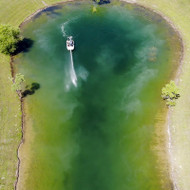
Phosphates Limit Successful Aquatic Management

The accumulation of phosphorus in ponds and lakes has significant and lasting impacts on an aquatic ecosystem and overall water quality. Unless phosphates are controlled, successful aquatic management is limited.
Escalating Phosphate Levels
Phosphorus is a nutrient that helps support the growth of aquatic plants and is a natural part of an aquatic ecosystem. Phosphates enter a pond or lake from leaves, twigs, grass clippings, fish waste, other organic matter and storm runoff, which carries fertilizers and other contaminants that can begin to disrupt the natural aquatic ecosystem.
Human activity is raising phosphate levels at an ever-increasing rate. Lawn fertilizer and agricultural runoff are large contributors to escalating phosphate levels.

Excessive Nutrients Fuel Poor Water Quality and Algae Blooms
High levels of nutrients, in particular phosphates, can cause toxic algae blooms, rampant weed growth, and poor water quality.
According to the Environmental Protection Agency, “Too much nitrogen and phosphorus in the water causes algae to grow faster than ecosystems can handle. Significant increases in algae harm water quality, food resources, and habitats and decrease the oxygen that fish and other aquatic life need to survive. Large growths of algae are called algal blooms and they can severely reduce or eliminate oxygen in the water, leading to illnesses in fish and the death of large numbers of fish. Some algal blooms are harmful to humans because they produce elevated toxins and bacterial growth that can make people sick if they come into contact with polluted water, consume tainted fish or shellfish, or drink contaminated water.”
In addition, poor water quality can negatively affect recreational opportunities, tourism, and property values.

EcoBoost PRx Controls Phosphates
EcoBoost PRx is designed to bind excess phosphates quickly, safely, and effectively, making them unusable as a food source for algae and weeds. EcoBoost PRx is a proprietary blend of naturally occurring phosphate binders designed to bind Free Reactive Phosphorus (FRP) permanently.
Field Study
Learn how a 16−week treatment plan using EcoBoost PRx reduced nearly 98% of Free Reactive Phosphorus (FRP), leading to increased water clarity and a reduction of harmful lake algae blooms in our EcoBoost PRx Phosphate Control Study. Click here to read the full study.
